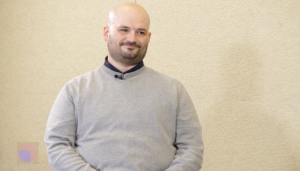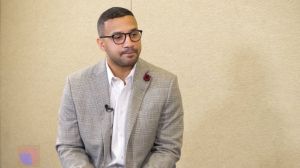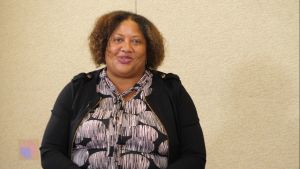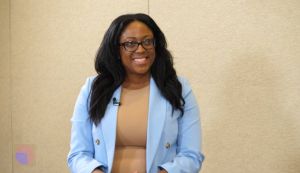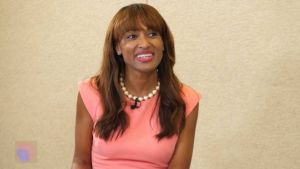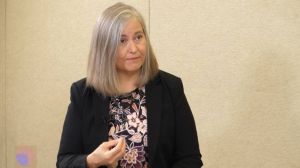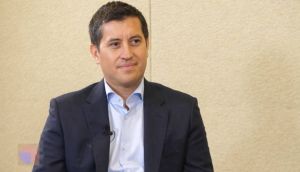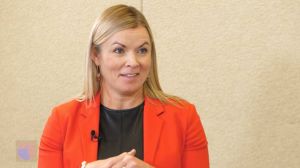AT&T is No. 3 on the Fair360, formerly DiversityInc Top 50 Companies list
Corey Anthony, who was named AT&T’s Chief Diversity Officer in the spring, is from the small town of Jewett, Texas, and was the first member of his family to attend college. He learned leadership skills through the course of his career and picked up valuable insights from mentors along the way. Corey believes in the power of diversity and inclusion to drive innovation and business growth and as the leader of one of the top D&I programs in corporate America, today he’s building on past successes.
Shane Nelson and Carolynn Johnson recently sat down with Corey in his office at AT&T’s Dallas headquarters for a wide-ranging, candid discussion about what he brings to his new role, his career at AT&T and how one mentor played a pivotal role in his development.
Shane:AT&T has a history of moving line of business leaders into the Chief Diversity Officer role, signaling that diversity is a business imperative. What are you looking to bring to the role
Corey:That’s a good observation. All three of my predecessors in this role had operational experience, and you’re right, we do believe this approach signals to the companyand to the public that diversity is a business imperative at AT&T. It helps to have a deep understanding of the operations side of the business and that’s what I bring with me, just as my predecessors did.
Shane:How does that background influence you in this new role
Corey:I’m an operations guy. I’ve been here 21 years and almost 19 of those have been in operations. I tend to have credibility with leaders across the business because I understand the challenges they’re facing. I can talk their language and understand their challenges because I’ve lived it with them. And I can challenge them to do things even better in terms of D&Iwith credibility.
Having that credibility makes it a little easier to have the conversationsand my operations perspective causes me to always be results-oriented. AT&T is a results-oriented company, so I come into this role asking questions, like: How do we improve on our results How do we define, track and reward success And how do we hold people accountable That’s an operations perspective.
Shane:AT&T has a dozen ERGs and 112,000 memberships. You co-founded a chapter of AT&T’s African American ERG and serve on several other ERGs. What has been your experience with ERGs in terms of the role they play in helping the company achieve its objectives
Corey:I had an opportunity to co-found the Kansas City chapter of Community NETwork, which has since been renamed The NETwork, early in my career, and I’ve been involved with them and other ERGs ever since. Our ERGs are critical on several fronts. First, they give our employees at every level a voice. The way we manage and interact with our ERGs, that voice can be heard by anyone up to and including our CEO, Randall Stephenson. We’re a large company, so there aren’t too many ways a frontline employee can have a direct audience with Randall or a direct line to me as an officer to talk about issues. The ERGs are good for that.
ERGs are also important from an engagement perspective. Employees feel more engaged because they know they have a voice. And ERGs are critical from a leadership perspective. You get a chance to hear directly from more people to interact with a wide range of employees in the context of D&I. Without ERGs, it would be a lot more challenging to make that happen. You put all that together, and yes, ERGs are core to who AT&T is as a company.
Shane:Did you have mentors and sponsors throughout your career
Corey:I absolutely had mentors throughout my career. I was extremely blessed. My first job in the company was in Wichita, Kansas. That was when we were Southwestern Bell, one of the original Bell operating companies. When I started, the person leading that region was Ray Wilkins, who went on to become a direct report to the CEO.
Ray had a very successful career. He was a VP at the time, and he cared about his new employees. That was a priority for him. He took me under his wing and I had the opportunity to learn from him. That was important for me and critical in terms of what I went on to do.
Shane:How did that mentor experience help Could you have advanced as far as you did without a sponsor
Corey:I had a good leader I could learn from directly. I could observe; I could watch him, because I was in his organization. I could see how he was leading and running his teams. By being his mentee, I got a chance to see it up close and personal. That was a beautiful thing. The second reason it was so important for me is I didn’t come from a background and a family that had a lot of professionals. We didn’t have any, in fact. I was the first person in my family to go to college. I had two first cousins who went to college, and they were teachers. So, I didn’t know anyone in a corporate or professional environment firsthand.
Shane:Ray Wilkins was a Black executive. Did you sense then that diversity in the C-suite was expanding
Corey:He was the first Black executive I could reach out to, and that I got to know personally. He was the one who made me believe anything was possible that a Black male could be a senior executive in this business, or any business. Ray made that real to me. It just so happened that he was my mentor as well, and it was my first job, so to this day, even though he’s retired, he’s still a mentor to me.
Shane:Did that influence your own participation as a mentor
Corey:It did, and it’s a big part of the reason I spend a lot of time mentoring. I know how much I benefited. I have a ton of mentors and mentees, both inside and outside of AT&T, and at all levels in the business. I have mentors who are in levels higher than where I am, and I have mentors in the business that are four or five levels below where I am, because they’re insightful and they give me honest, candid feedback. And I have mentees across the same spectrums. We share perspectives that we might not be exposed to otherwise.
Shane:What advice can you give on developing executive presence
Corey:I think it’s important to define what we mean by “executive presence” because I’ve found that it means different things to different people. I think it has a lot to do with one’s ability to articulate and communicate well: How do you interact with and come across to people and to executives specifically My recommendation is to develop those skill sets. For most people, they’re not innate. They have to be developed over time. My advice is to put yourself in situations where you have to use those skills. Look for opportunities to lead your peers. If your knowledge is not as deep on a particular subject, study that subject, and learn how to communicate about it effectively. The same applies for interacting with senior leaders. Get yourself into positions where you have the opportunity to interact with them. Then polish and hone your skills and develop your own executive presence.
Carolynn:How important is it to just be yourself
Corey:That is so important. Be who you are, especially in terms of developing an executive presence. I see people try and mimic others’ style of delivery, for example. That’s a mistake. Do what works for you. Be who you are. I’m a country boy; that’s who I am, that’s part of me. I like to have fun but I’m candid and direct. I bring these attributes to everything I do, including my executive presence.
Carolynn:Does that leadership style make you effective in your role
Corey:I think so. I tell people to embrace who they are. Bring your good qualities to the forefront. When you do, you come across naturally and people will gravitate toward you. They’ll see you as someone they want to connect with. And to me, that’s what leadership is all about.



